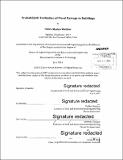Probabilistic evaluation of flood damage in buildings
Author(s)
Wathier, Claire-Marine
DownloadFull printable version (10.76Mb)
Other Contributors
Massachusetts Institute of Technology. Department of Civil and Environmental Engineering.
Advisor
Pierre Ghisbain and Jerome J. Connor.
Terms of use
Metadata
Show full item recordAbstract
Because the ocean level keeps rising and because hurricanes and storms become increasingly destructive in terms of damage and economic loss, the built environment has become very vulnerable to floods. Every city is building a resilient plan to decrease its vulnerability. However, the studies are often reduced to case studies and if engineers manage to build smarter, to upgrade or strengthen existing systems, they do not necessarily evaluate accurately their effect on damage. This is why this thesis starts by identifying the key factors that define and impact flood damage, then defining other parameters that are more oriented towards resilience. Based on these considerations, a probabilistic evaluation of flood damage in buildings can be conducted and the sensitivity of each parameter is evaluated in order to reduce the total loss. Then a new objective becomes to find how modifying parameters, and consequently the structure, leads to less damage without losing its cost-effectiveness. The first thesis' aim was to evaluate flood damage on buildings. However, building's damage is more diverse than expected and evaluating flood damage effect turns out to be actually only the beginning in the process of resilience.
Description
Thesis: M. Eng., Massachusetts Institute of Technology, Department of Civil and Environmental Engineering, 2014. Cataloged from PDF version of thesis. Includes bibliographical references (page 77).
Date issued
2014Department
Massachusetts Institute of Technology. Department of Civil and Environmental EngineeringPublisher
Massachusetts Institute of Technology
Keywords
Civil and Environmental Engineering.